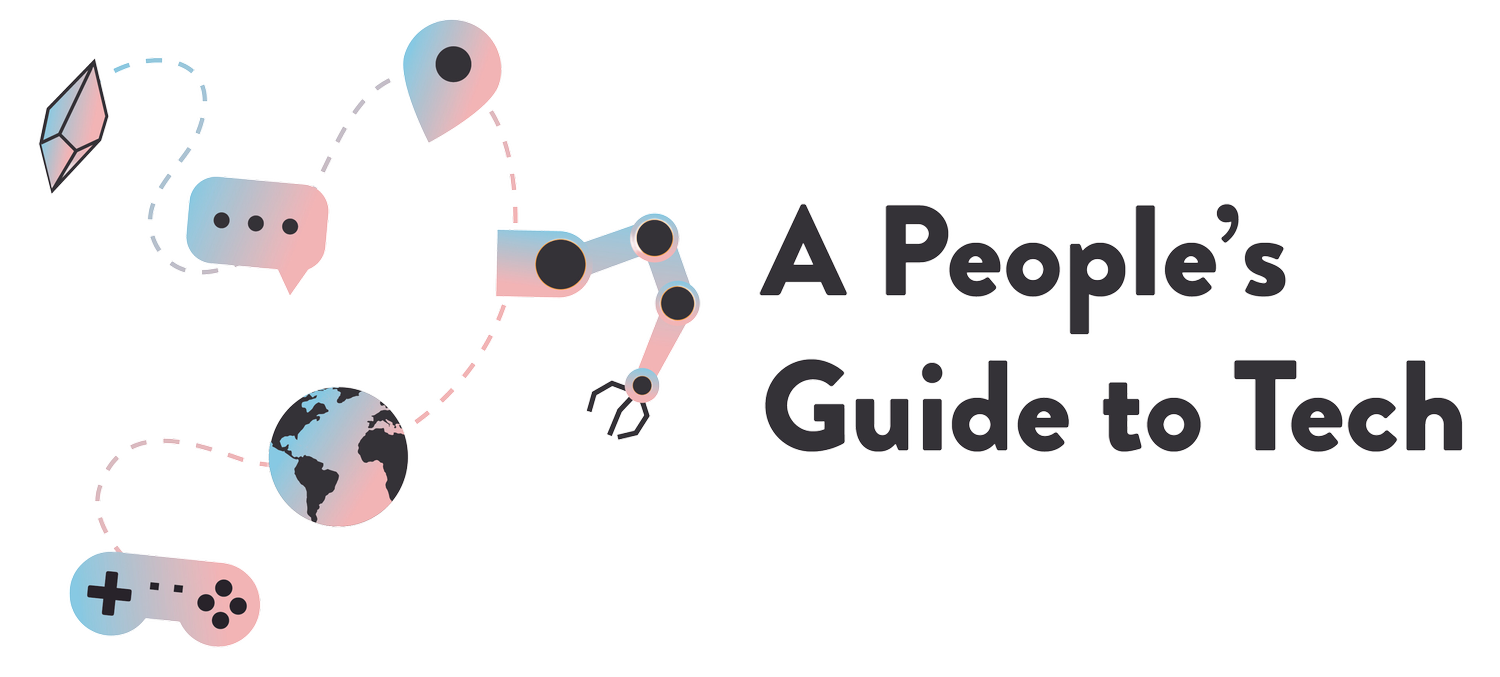We make zines about technology
Zines are self-published, original works with a deep history in DIY spaces. We publish guides, handbooks, and creative materials that draw from the subversive, communal spirit of zines.
Our guides use a popular education methodology to dive deep into one specific form of recent technology (see A People’s Guide to AI). These are geared towards anyone and everyone who is interested in the topic.
Our handbooks are publications where we collaborate with and draw from the research materials of other justice-oriented organizations. These are available for everyone, though focused on those currently organizing around a technology.
All of our other releases are creative materials. These are our shortest and most experimental outputs. They’re posters, art cards, stickers, brochures, and more. They directly reflect the DIY spirit of the zines and self-publishing worlds that we started in.
What We Do
-

We bring tech down to Earth
From a distance, technological systems can seem abstract and complicated. Through zines and workshops, we makes technology easy for anyone to understand.
-

We show how technical systems really work
All of our materials show how sociotechnical systems connect to other existing structures.
-

We always focus on agency
We unearth practical research, examples, and practices that allow readers and participants to make sense of past technology and create their own visions for the future.
Who we are
-

Mimi Onuoha
Mimi Onuoha has worked as an artist, educator, and researcher for close to a decade. As an artist, her projects frequently involve working to create datasets and investigate complex technical realities in ways that are engaging and surprising. As a teacher, she uses an active learning approach to work alongside learners. As a researcher, she’s focused on how social structures impact different groups in different ways.
Mimi’s dual artistic and research-driven approach is a hallmark of APGT’s approach to making creative materials.
-

Diana Nucera
Diana J Nucera, aka “Mother Cyborg,” is a multimedia artist who uses music, performance, DIY publishing, community organizing tactics and popular education methods to elevate collective technological consciousness and agency. Diana’s art draws from and includes thirteen years of community organizing work in Detroit, Michigan, during which time she wrote guides and devised organizing models to fight digital redlining.
Diana has a long track record of organizational development and leadership. At Allied Media Projects, she created “Community Technology,” the concept of making technology based on community needs. This pedagogy, which she used to found the Detroit Community Technology Project, animates APGT.

Theory of Change:
We believe that in order to cultivate a future that is just and equitable, individuals and communities must transform their relationships to technology from passive consumers to agents of change. We believe one path to doing this is through developing critical thinking and a greater sense of agency towards technology. With this in mind, we work to demystify emerging technology and ground the understanding of tech within our relationships to one another and the planet. By using art, creativity, popular education, and critical pedagogy, we open up new ways of knowing, teaching, learning, and being, with the end goal of technology becoming a tool for liberation.

Board Members
Zara Rahman
Zara Rahman is a Berlin-based researcher and writer whose interests lie at the intersection of power, technology and justice. Over the past decade, her work has focused on supporting the responsible use of data and technology in advocacy and social justice, working with activists from around the world to support context-driven and thoughtful uses of tech and data. She is the Deputy Director at The Engine Room, an international non-profit organisation supporting civil society to use tech and data more effectively and strategically. She has held fellowships with the Digital Civil Society Lab at Stanford University, digitalHKS at the Harvard Kennedy School, and Data & Society, and serves on the Board of Trustees of Saheli, a UK-based non-profit providing support and refuge to women of colour fleeing domestic abuse.
Dr. Simone Browne
Simone Browne is Associate Professor in the Department of African and African Diaspora Studies at the University of Texas at Austin. She is also Research Director of Critical Surveillance Inquiry (CSI) with Good Systems, a research collaborative at the University of Texas at Austin. CSI works with scholars, organizations and communities to curate conversations, exhibitions and research that examine the social and ethical implications of surveillance technologies, both AI-enabled and not. With a focus on algorithmic harm and tech equity, we continually question “what’s good?” in order to better understand the development and impact of
artificial intelligence.
Simone is currently writing her second book manuscript, Like the Mixture of Charcoal and Darkness, which examines the interventions made by artists whose works grapple with the surveillance of Black life, from policing, privacy, smart dust and the FBI’s COINTELPRO to encryption, electronic waste and artificial intelligence. Together, these essays and interviews explore the productive possibilities of rebellious methodologies and creative innovation when it comes to troubling surveillance and its various tactics, and imagining Black life beyond the surveillance state.




